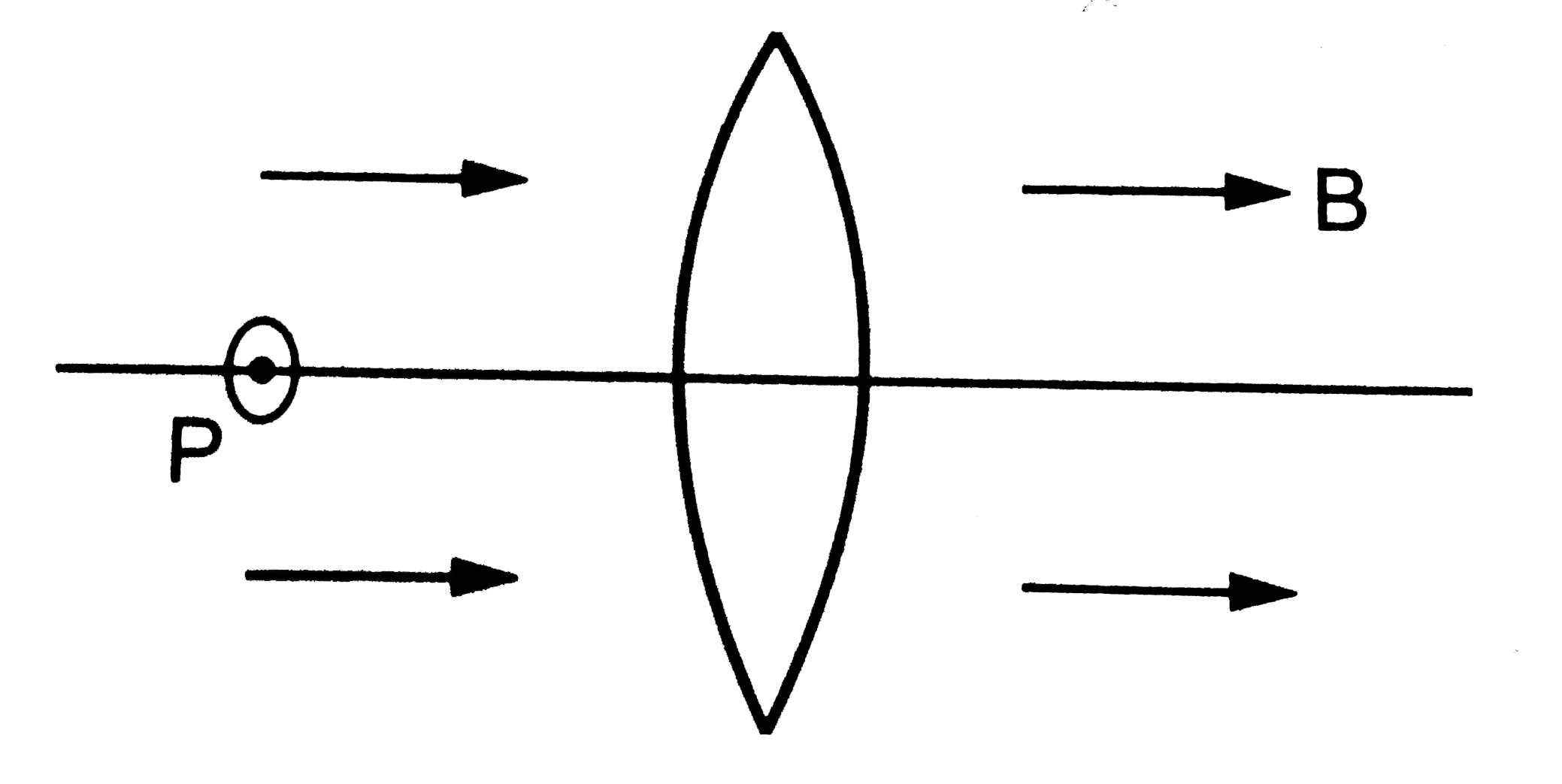Shows a convex lens of focal length 12 cm lying in a uniform magnetic field B of magnitude 1.2 T parallel to its principal axis. A particle having a charge 2.0X10−3C and mass 2.0X10−5 kg is projected perpendiucular to the plane of the diagram with a speed of 4.8ms−1. The particle moves along a circle with its centre on the principal axis at a distance of 18 cm from the lens. Show that the image of the particle goes along a circle end find the radius of thet circle.

The object will make a path , perpndicular to the plane of paper
Let the radius 0f the object be r=mqqB
Here object distance =k=18cm
Using (lens equation ), v=36cm.
Let the circular path of image =r'<br>So,magnification= (magnetic path )
Thus r'=2×4=8cm.
Hence the radius of the circular path in
which the image move is 8 cm.
Topper's Solved these Questions
Similar Questions
If a charged particle at rest experiences no electromagnetic force, then electric field in that region
View SolutionFind the range of frequency of light that is visible to an average human being (400nm<λ<700nm)
View SolutionUsing the formulae ((→F)=(→qv)×(→B)and(B=(μ0)i2πr), show that the SI units of the magnetic field B and the permeability constant (mu_0) may be written as (N mA ^-1) and (NA^-2) respectively.
View SolutionA particle having a charge of 2.0X10−8C and a mass of 2.0X10−10g is projected with a speed of 2.0X103ms−1 in a region having a uniform magnetic field of 0.10 T. The velocity is perpendicular to the field. Find the radius of the circle formed by the particle and also the time period.
View SolutionA particle of charge −16×10−18coo–mb moving with velocity 10ms−1 along the x−aξs, and an electric field of magnitude (104)/(m) is along the negative z−ais. If the charged particle continues moving along the x−aξs , the magnitude of B is
View SolutionAn electron of mass 0.90×10−30 kg under the action of a magnetic field moves in a circle of 2.0 cm radius at a speed 3.0×106ms−1. If a proton of mass 1.8×10−27kg was to move in a circle of the same radius in the same magnetic field, then its speed will be
View SolutionA charged particle is projected in a magnetic field vec(B)=10hat(k)T from the origin in x-y plane. The particle moves in a circle and just touches a straight line y=5(m) at x=5sqrt(3)(m) . Then ( mass of particle =5xx10^(5-)kg , charge =1 mu C )
View SolutionA particle having a charge of 10.0 mu C and mass 1 mug moves in a circle of radius 10 cm under the influence of a magnetic field of induction0.1 T. When the particle is at a point P, a uniform electric field is switched on so that the particle starts moving along the tangent with a uniform velocity. The electric field is
View SolutionA particle of mass 10 kg is moving with a uniform speed of 6m/sec, in x-y plane along the line 3y=4x+10 the magnitude of its angular momentum about the origin in kg2/s
View SolutionFigure shows a convex lens of focal length 10cm lying in a uniform magnetic field B of magnitude 1.2 T parallel to its principal axis.A particle havig a charge 2.0xx10^(-3) C and mass 2.0xx10^(-5) kg is projected perpendicular to the plane of the diagram with a speed of 4.8 m//s .The particle moves along a circle with its centre on the principal axis at a distance of 15 cm from the lens.The axis of the lens and of the circle are same.Show that the image of the particle goes along a circle and find the radius of that circle.
View SolutionA uniform magnetic field of magnitude 0.20 exists in space from east to west.A particle having mass 10−5kg and charge 10−5C is projected from south to north so that it moves with a uniform velocity.Find velocity of projection of the particle? (g=10m/s2)
View SolutionAn electron of mass 0.90×10−30 kg under the action of a magnetic field moves in a circle of 2.0 cm radius at a speed 3.0×106ms−1. If a proton of mass 1.8×10−27kg was to move in a circle of the same radius in the same magnetic field, then its speed will be
View Solutionएक समान चुंबकीय क्षेत्र की दिशा के अनुदिश एक आवेशित कण प्रक्षेपित किया जाता है। तब इसका वेग
View SolutionA particle having a charge of 2.0X10−8C and a mass of 2.0X10−10g is projected with a speed of 2.0X103ms−1 in a region having a uniform magnetic field of 0.10 T. The velocity is perpendicular to the field. Find the radius of the circle formed by the particle and also the time period.
View SolutionThere is a uniform electric field of strength 10^3 Vm^(-1) along Y-axis. A body of mass lgm and charge 10^(-6) C is projected into the field from origin along the positive X-axis with a velocity of 10 ms^(-1) Its speed in ms^(-1) after 10s is (Neglect gravitation)
View SolutionAn electron of mass 0.90×10−30 kg under the action of a magnetic field moves in a circle of 2.0 cm radius at a speed 3.0×106ms−1. If a proton of mass 1.8×10−27kg was to move in a circle of the same radius in the same magnetic field, then its speed will be
View Solution
